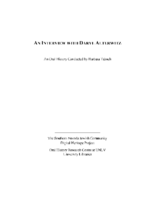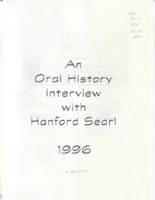Search the Special Collections and Archives Portal
Search Results

Transcript of interview with Carolyn Goodman by Barbara Tabach, August 18, 2016
Date
Archival Collection
Description
Carolyn Goldmark Goodman (1939- ) is the mayor of the city of Las Vegas, Nevada. She began her first four-year term in office on July 6, 2011 and was re-elected for a second term in April 2015. She succeeded her husband of 50 years, Oscar B. Goodman, who served three terms as mayor. Carolyn founded The Meadows School in Las Vegas in 1984, the state's first nonprofit, college preparatory school for pre-kindergarten through 12th grade. She oversaw planning and daily operations of the school for 26 years, retiring in 2010. Carolyn and Oscar Goodman arrived in Las Vegas in 1964. Carolyn Goodman started out working in the hotel industry, and later earned her master's degree in counseling from the University of Nevada, Las Vegas (UNLV) while raising four children. As mayor, Goodman has focused on improving public education and the local economy. She is a board member of the Las Vegas Convention and Visitors Authority and serves on the Las Vegas Global Economic Alliance (LVGEA). She is actively involved in the United States Conference of Mayors (USCM), as a member of its Advisory Board, vice-chair of its Task Force on Education Reform, and chair of the Mayors? Business Council. In 2014 Goodman received the UCSM?s Large City Climate Protection Award. As leader of the Meadows School, Goodman was recognized nationally by the Council for Advancement and Support of Education (CASE) and the National Association of Independent Schools in 2006 with the Seymour Preston Trustee Award for Leadership. She has also been honored by UNLV, receiving the Distinguished Nevada award in 1989, an Honorary Doctor of Laws degree (PhD) in 2006, and Alumni of the Year in Education in 2010. In this interview, Goodman talks about her family background and touches upon her childhood in New York City and attending Bryn Mawr College, where she met Oscar. She discusses the growth of the Las Vegas Jewish population since arriving, efforts to build Jewish community, and her involvement, including with Temple Beth Sholom and the Jewish Federation. In addition, Goodman talks at length about her husband?s political career as well as her own, both dedicated to developing Las Vegas into a safe and prosperous city, with quality education, health care, and arts and culture offerings. She also discusses establishing The Meadows School.
Text

Transcript of interview with Doug Unger by Barbara Tabach, August 26, 2014
Date
Archival Collection
Description
Interview with Doug Unger by Barbara Tabach on August 26, 2014. In the interview, Unger discusses his schooling, his family's mattress business, and his endeavors in the company and the mattress industry in Las Vegas. Unger becomes involved in Holocaust education and the Sperling Kronberg Mack Holocaust Resource Center.
Doug Unger was born in Cleveland, Ohio, and grew up working summers in a mattress factory, a family business started by his maternal grandfather. After graduating from high school in Cleveland, Doug attended the University of Cincinnati until moving to Steamboat Springs, and enrolled in Denver University, though ended his college career one class away from graduation. Eventually, Unger moved back to Cleveland, then to Las Vegas. In 1976, Dough bought Supreme Mattress and moved to Las Vegas to build his new business. Outside his successful career, Doug was always an active member in the city's Jewish community. He joined Congregation Ner Tamid, where he was a trustee. He became involved with the Jewish Federation, serving as treasurer and later as president. When he moved to Reno, Doug joined Temples Sinai and Emanu-el, and also became heavily involved with Guide Dogs for the Blind Friends Committee, serving as its director for a period of time. He was also the co-chair of the Governor's Advisory Council on Education Related to the Holocaust (GAC). Doug was instrumental in establishing the Library for Holocaust Studies as a successful organization, independent of the Jewish Federation. The Library is now located in its own, donated space, run by trained staff, and receives $200,000 from the state biennially.
Text

Transcript of interview with Daryl Alterwitz by Barbara Tabach, November 8, 2014
Date
Archival Collection
Description
Interview transcript with Daryl Alterwitz by Barbara Tabach on November 8, 2014. In this interview Daryl Alterwitz, son of Deanne and Oscar Alterwitz, recalls moving to Las Vegas from Gary, Indiana, for his parents' pursuits in the furniture business. He speaks about his schooling at Valley High School, his friendship with Robert Engel, and attending University of California Santa Cruz, and taking a leave of absence to travel through Asia. Alterwitz became more involved in Judaism after his bar mitzvah, and has continued his religious affiliation throughout his adult life, and has traveled to Israel twice. He talks about meeting his former wife, his travels through Europe, and coming back to Las Vegas after some time in Reno.
In 1959, Daryl Alterwitz was born in Gary, Indiana, son of Oscar and Deanne Alterwitz. When he was thirteen years old, his family moved to Las Vegas to capitalize on new opportunities in the growing city, and his parents purchased Walker Furniture soon after their arrival. As a high school student, Daryl experienced a powerful trip to Israel, which strengthened his connection to Judaism. After graduation from Valley High School, Daryl attended the University of California - Santa Cruz, and after two years of study, Daryl took time off to travel throughout South Asia, accompanied by close childhood friend Robert Engel. He returned after a year and graduated with an independent major in classical studies. From there, Daryl spent more time in Israel living on a kibbutz. Daryl next went to law school at Santa Clara University, and then supplemented his education with a degree in taxation from New York University School of Law. Between law school and New York, he met his wife, Teri Shoofey; they two had two children, though are now divorced. After New York, he returned to Nevada, first living in Reno. After his father passed away, Daryl moved back to Las Vegas, and took on more responsibility with the family business as well as practicing law. Daryl?s commitment to community service is enduring and visible. He has donated his time and resources to both Jewish organizations, like Jewish Family Services, and non-Jewish groups, like Las Vegas Rescue Mission. He has also served on the boards of the Jewish Federation, Congregation Ner Tamid, and the Anti-Defamation League. Daryl also continues to indulge his passion for international travel, having visited Morocco, Egypt, Turkey, Cambodia, and has even biked from Hungary to Poland.
Text

Transcript of interview with Rowena Gonzalez by Michael Boyd, March 1, 1977
Date
Archival Collection
Description
On March 1, 1977, Michael Boyd interviewed Rowena Gonzalez (born 1946 in Wichita Falls, Texas) about her life in Nevada. Gonzalez first talks about her family background and residential history before discussing the way of life in Texas and eventually in Las Vegas. Several topics covered in the interview include Gonzalez’s recollections of the atomic testing, the building of the Hoover Dam, and Howard Hughes. The two also discuss tourism, the properties on the Strip and in Downtown Las Vegas, and early means of transportation.
Text

Transcript of interview with Guy Hamblin by Barry Merrell, February 22, 1975
Date
Archival Collection
Description
On February 22, 1975, Barry Merrell interviewed former railroad worker Guy Hamblin (born 1896 in Clover Valley, Nevada) in his home at 4306 Kay Place, Las Vegas, Nevada about the history of Southern Nevada. Specifically, the two discuss Hamblin moving from different towns in Nevada before settling down in Southern Nevada, viewing the above-ground atomic bomb tests, early Fremont Street, and his work on the railroad. In addition, Hamblin also discusses the demographic and economic changes that he has seen in Las Vegas.
Text

Transcript of interview with Judith L. Hamblin by Margaret Stambro, March 30, 1976
Date
Archival Collection
Description
On March 30, 1976, collector Margaret Stambro interviewed schoolteacher and registered medical stenographer, Judith L. Hamblin (born June 11, 1941 in Las Vegas, Nevada) in her home in Henderson, Nevada. This interview covers the history of Henderson, local schools and teachers, and Helldorado. Also during this interview, Mrs. Hamblin discusses her fondness for Lake Mead, the Basic Magnesium Plant, Nellis Air Force Base, and the early aboveground atomic blasts.
Text

Transcript of interview with Dorothy Ross Fletcher by Sharon Hildebrandt, June 26, 1975
Date
Archival Collection
Description
On June 26, 1975, Sharon Hildebrandt interviewed Dorothy Ross Fletcher (born 1936 in Las Vegas, Nevada) about growing up in and living in Southern Nevada. Fletcher first talks about that various towns in which she lived while growing up before discussing the schools she attended. She also discusses the changes in schools, her involvement in politics, church activity, gambling as a recreational activity, and prominent visitors who came to Las Vegas. Fletcher also talks about living in Nevada during World War II, the atomic testing, environmental changes and extreme weather, and the social changes in Las Vegas. The latter part of the interview involves discussion of real estate, the introduction of air conditioning for cooling, changes on the Las Vegas Strip, recreational activities available to youth in Las Vegas and the increase in the nonnative population.
Text

Transcript of interview with Mary Habbart by Jane Finfrock, February 28, 1979
Date
Archival Collection
Description
On February 28, 1979, Jane Finfrock interviewed Mary Habbart (born 1897 in Boothwyn, Pennsylvania) about her life in Southern Nevada. Habbart first talks about her move to Las Vegas in 1920 and her husband’s subsequent employment. She also talks about the first casinos, the development of the university campus, visits of U.S. presidents, and the Mormon Fort. She also discusses the Helldorado Parade, flash floods, snowing in Las Vegas, her role in developing Sunset Park, her family, and her education.
Text

Transcript of interview with Kent "Tim" Hafen by Gregory Hafen, March 4, 1975
Date
Archival Collection
Description
On March 4, 1975 collector Gregory T. Hafen interviewed his father, Kent (Tim) Hafen (born April 17th, 1932 in St. George, Utah) at his ranch home in Pahrump, Nevada. This interview covers the history and development of Pahrump from 1951 to 1975. Kent relocated to Pahrump, Nevada in 1951, after living in Mesquite, Nevada from 1932 to 1951. Kent was a local farmer.
Text

Transcript of interview with Hanford Searl by Dennis McBride, November 2, 1996
Date
Archival Collection
Description
Dennis McBride interviews Hanford Searl about a number of things: his being gay, his being gay in Las Vegas and other places, religious issues. Also, some information about working at the Las Vegas Review-Journal, and for Bob Brown at the Las Vegas Valley Times.
Text
